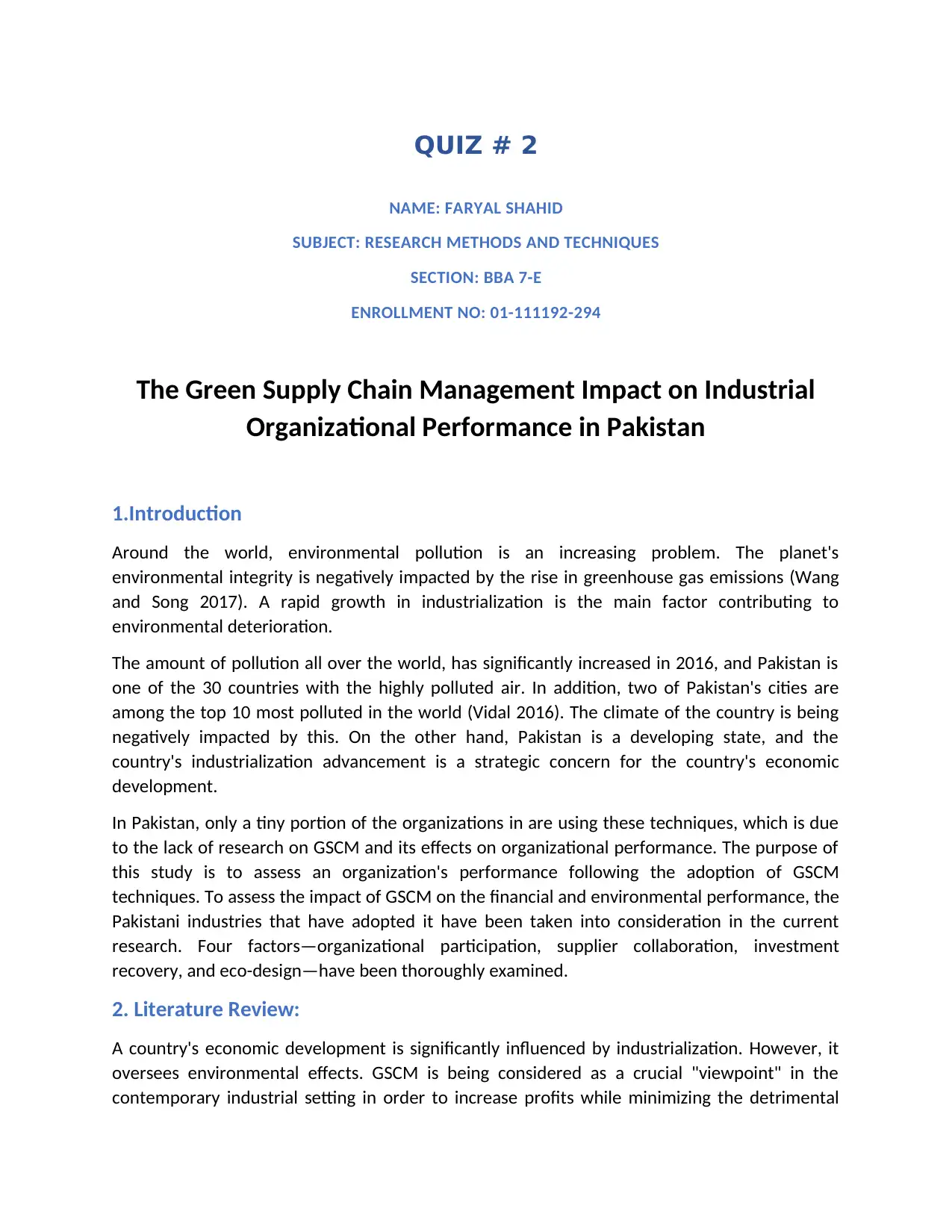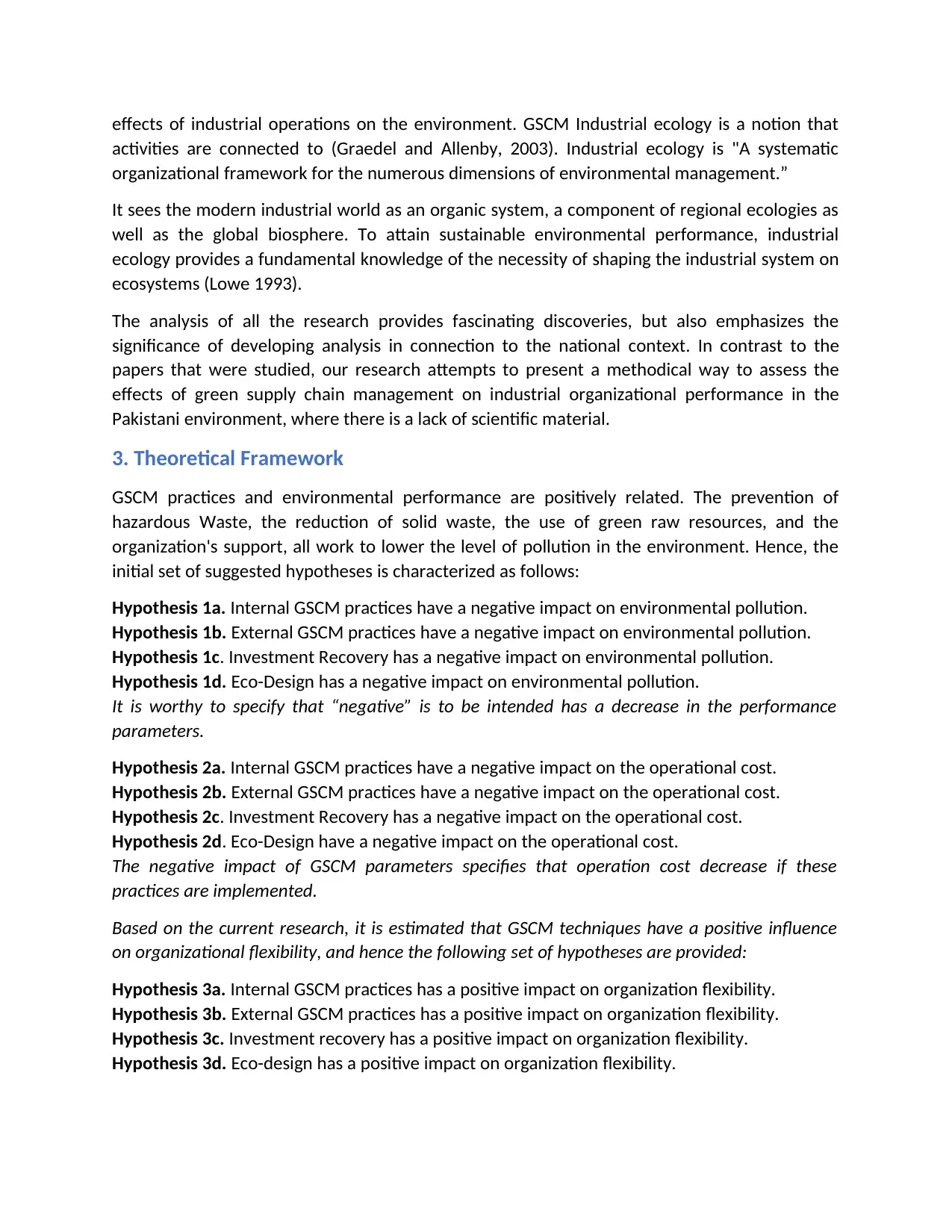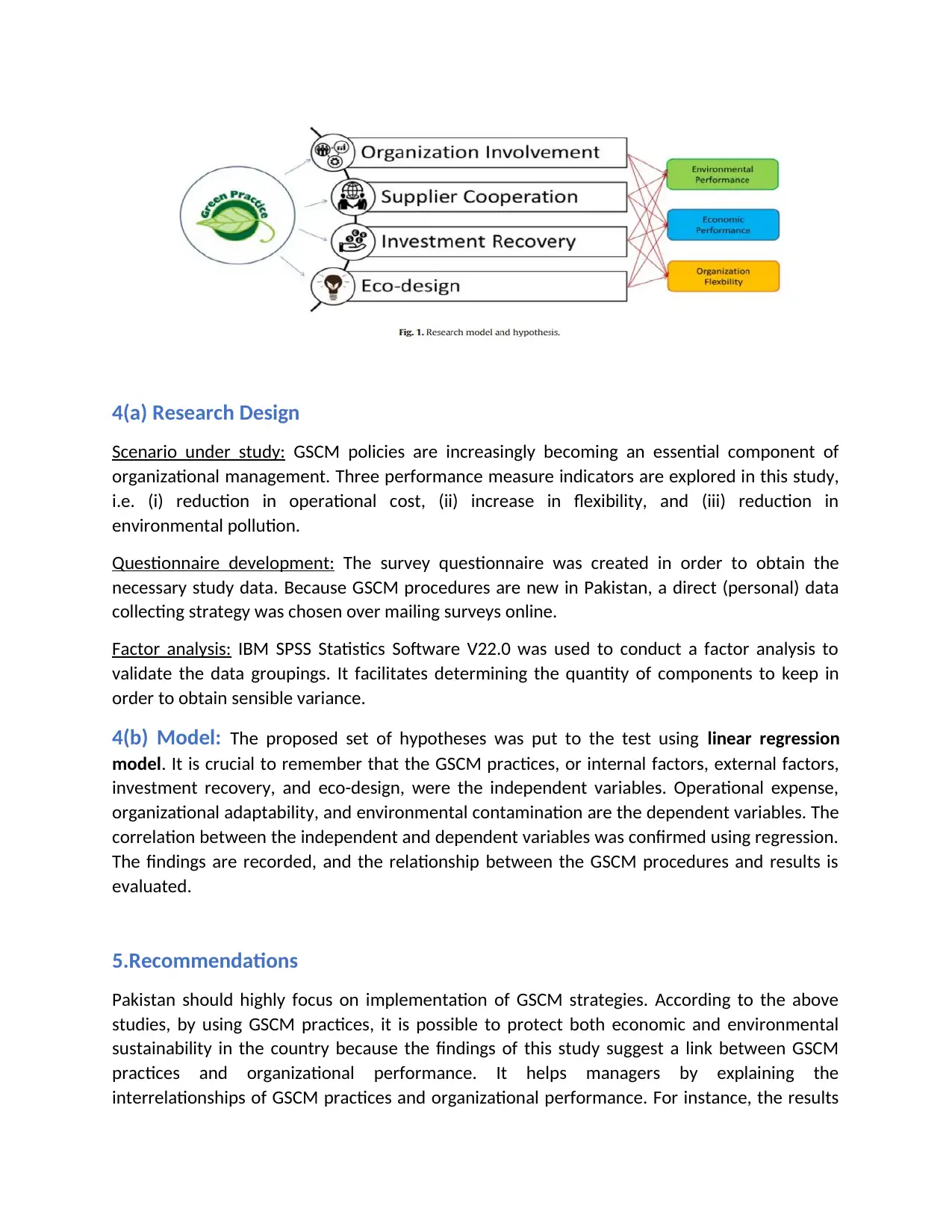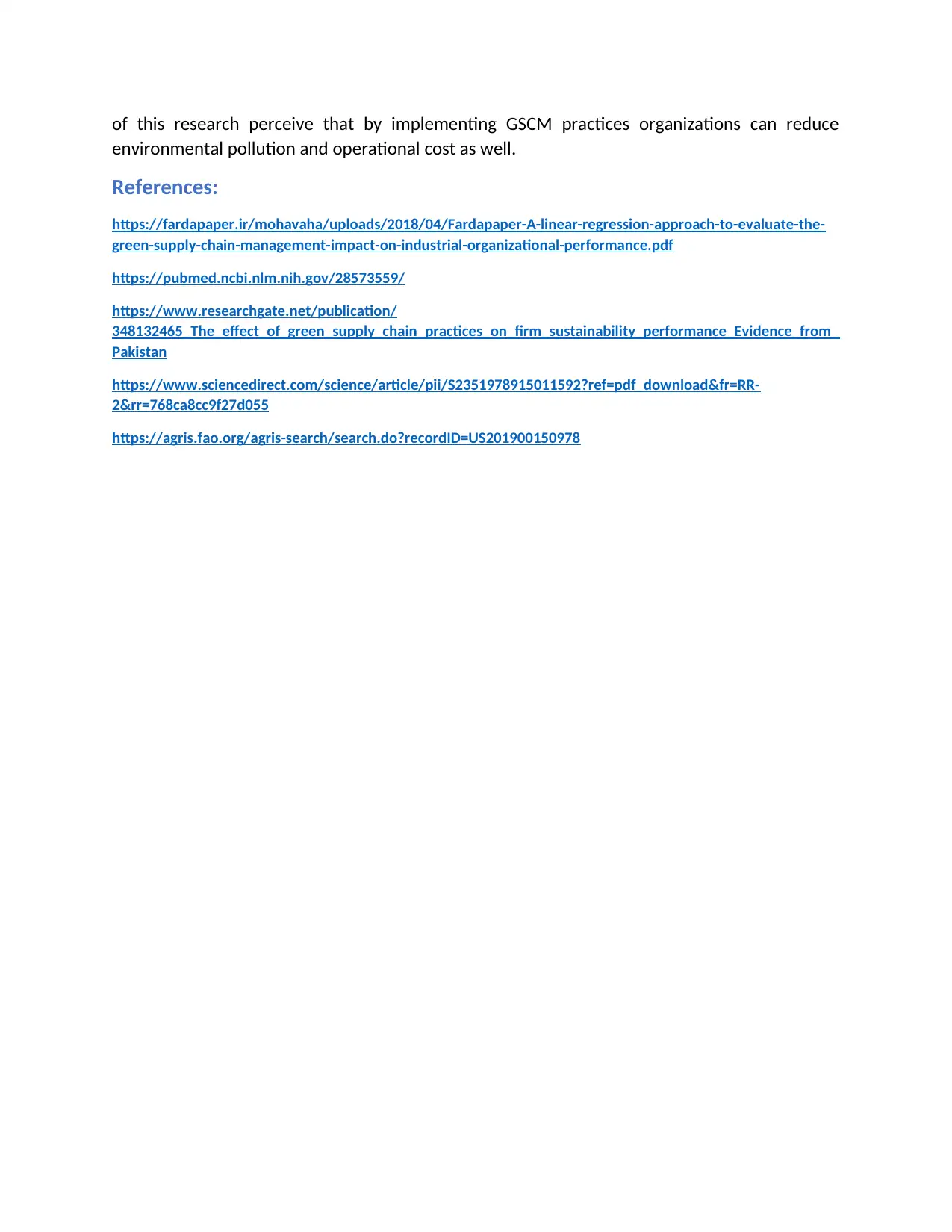Green Supply Chain Management Impact on Industrial Organizational Performance in Pakistan: A Study
VerifiedAdded on 2023/05/22
|4
|1117
|271
AI Summary
In this quiz we will discuss about green supply chain management and below are the summaries point:-
Industrialization contributes to environmental pollution, with Pakistan being one of the countries affected.
Limited research on Green Supply Chain Management (GSCM) and organizational performance in Pakistan.
GSCM practices positively impact environmental performance, reducing pollution and waste.
Contribute Materials
Your contribution can guide someone’s learning journey. Share your
documents today.

QUIZ # 2
NAME: FARYAL SHAHID
SUBJECT: RESEARCH METHODS AND TECHNIQUES
SECTION: BBA 7-E
ENROLLMENT NO: 01-111192-294
The Green Supply Chain Management Impact on Industrial
Organizational Performance in Pakistan
1.Introduction
Around the world, environmental pollution is an increasing problem. The planet's
environmental integrity is negatively impacted by the rise in greenhouse gas emissions (Wang
and Song 2017). A rapid growth in industrialization is the main factor contributing to
environmental deterioration.
The amount of pollution all over the world, has significantly increased in 2016, and Pakistan is
one of the 30 countries with the highly polluted air. In addition, two of Pakistan's cities are
among the top 10 most polluted in the world (Vidal 2016). The climate of the country is being
negatively impacted by this. On the other hand, Pakistan is a developing state, and the
country's industrialization advancement is a strategic concern for the country's economic
development.
In Pakistan, only a tiny portion of the organizations in are using these techniques, which is due
to the lack of research on GSCM and its effects on organizational performance. The purpose of
this study is to assess an organization's performance following the adoption of GSCM
techniques. To assess the impact of GSCM on the financial and environmental performance, the
Pakistani industries that have adopted it have been taken into consideration in the current
research. Four factors—organizational participation, supplier collaboration, investment
recovery, and eco-design—have been thoroughly examined.
2. Literature Review:
A country's economic development is significantly influenced by industrialization. However, it
oversees environmental effects. GSCM is being considered as a crucial "viewpoint" in the
contemporary industrial setting in order to increase profits while minimizing the detrimental
NAME: FARYAL SHAHID
SUBJECT: RESEARCH METHODS AND TECHNIQUES
SECTION: BBA 7-E
ENROLLMENT NO: 01-111192-294
The Green Supply Chain Management Impact on Industrial
Organizational Performance in Pakistan
1.Introduction
Around the world, environmental pollution is an increasing problem. The planet's
environmental integrity is negatively impacted by the rise in greenhouse gas emissions (Wang
and Song 2017). A rapid growth in industrialization is the main factor contributing to
environmental deterioration.
The amount of pollution all over the world, has significantly increased in 2016, and Pakistan is
one of the 30 countries with the highly polluted air. In addition, two of Pakistan's cities are
among the top 10 most polluted in the world (Vidal 2016). The climate of the country is being
negatively impacted by this. On the other hand, Pakistan is a developing state, and the
country's industrialization advancement is a strategic concern for the country's economic
development.
In Pakistan, only a tiny portion of the organizations in are using these techniques, which is due
to the lack of research on GSCM and its effects on organizational performance. The purpose of
this study is to assess an organization's performance following the adoption of GSCM
techniques. To assess the impact of GSCM on the financial and environmental performance, the
Pakistani industries that have adopted it have been taken into consideration in the current
research. Four factors—organizational participation, supplier collaboration, investment
recovery, and eco-design—have been thoroughly examined.
2. Literature Review:
A country's economic development is significantly influenced by industrialization. However, it
oversees environmental effects. GSCM is being considered as a crucial "viewpoint" in the
contemporary industrial setting in order to increase profits while minimizing the detrimental
Secure Best Marks with AI Grader
Need help grading? Try our AI Grader for instant feedback on your assignments.

effects of industrial operations on the environment. GSCM Industrial ecology is a notion that
activities are connected to (Graedel and Allenby, 2003). Industrial ecology is "A systematic
organizational framework for the numerous dimensions of environmental management.”
It sees the modern industrial world as an organic system, a component of regional ecologies as
well as the global biosphere. To attain sustainable environmental performance, industrial
ecology provides a fundamental knowledge of the necessity of shaping the industrial system on
ecosystems (Lowe 1993).
The analysis of all the research provides fascinating discoveries, but also emphasizes the
significance of developing analysis in connection to the national context. In contrast to the
papers that were studied, our research attempts to present a methodical way to assess the
effects of green supply chain management on industrial organizational performance in the
Pakistani environment, where there is a lack of scientific material.
3. Theoretical Framework
GSCM practices and environmental performance are positively related. The prevention of
hazardous Waste, the reduction of solid waste, the use of green raw resources, and the
organization's support, all work to lower the level of pollution in the environment. Hence, the
initial set of suggested hypotheses is characterized as follows:
Hypothesis 1a. Internal GSCM practices have a negative impact on environmental pollution.
Hypothesis 1b. External GSCM practices have a negative impact on environmental pollution.
Hypothesis 1c. Investment Recovery has a negative impact on environmental pollution.
Hypothesis 1d. Eco-Design has a negative impact on environmental pollution.
It is worthy to specify that “negative” is to be intended has a decrease in the performance
parameters.
Hypothesis 2a. Internal GSCM practices have a negative impact on the operational cost.
Hypothesis 2b. External GSCM practices have a negative impact on the operational cost.
Hypothesis 2c. Investment Recovery has a negative impact on the operational cost.
Hypothesis 2d. Eco-Design have a negative impact on the operational cost.
The negative impact of GSCM parameters specifies that operation cost decrease if these
practices are implemented.
Based on the current research, it is estimated that GSCM techniques have a positive influence
on organizational flexibility, and hence the following set of hypotheses are provided:
Hypothesis 3a. Internal GSCM practices has a positive impact on organization flexibility.
Hypothesis 3b. External GSCM practices has a positive impact on organization flexibility.
Hypothesis 3c. Investment recovery has a positive impact on organization flexibility.
Hypothesis 3d. Eco-design has a positive impact on organization flexibility.
activities are connected to (Graedel and Allenby, 2003). Industrial ecology is "A systematic
organizational framework for the numerous dimensions of environmental management.”
It sees the modern industrial world as an organic system, a component of regional ecologies as
well as the global biosphere. To attain sustainable environmental performance, industrial
ecology provides a fundamental knowledge of the necessity of shaping the industrial system on
ecosystems (Lowe 1993).
The analysis of all the research provides fascinating discoveries, but also emphasizes the
significance of developing analysis in connection to the national context. In contrast to the
papers that were studied, our research attempts to present a methodical way to assess the
effects of green supply chain management on industrial organizational performance in the
Pakistani environment, where there is a lack of scientific material.
3. Theoretical Framework
GSCM practices and environmental performance are positively related. The prevention of
hazardous Waste, the reduction of solid waste, the use of green raw resources, and the
organization's support, all work to lower the level of pollution in the environment. Hence, the
initial set of suggested hypotheses is characterized as follows:
Hypothesis 1a. Internal GSCM practices have a negative impact on environmental pollution.
Hypothesis 1b. External GSCM practices have a negative impact on environmental pollution.
Hypothesis 1c. Investment Recovery has a negative impact on environmental pollution.
Hypothesis 1d. Eco-Design has a negative impact on environmental pollution.
It is worthy to specify that “negative” is to be intended has a decrease in the performance
parameters.
Hypothesis 2a. Internal GSCM practices have a negative impact on the operational cost.
Hypothesis 2b. External GSCM practices have a negative impact on the operational cost.
Hypothesis 2c. Investment Recovery has a negative impact on the operational cost.
Hypothesis 2d. Eco-Design have a negative impact on the operational cost.
The negative impact of GSCM parameters specifies that operation cost decrease if these
practices are implemented.
Based on the current research, it is estimated that GSCM techniques have a positive influence
on organizational flexibility, and hence the following set of hypotheses are provided:
Hypothesis 3a. Internal GSCM practices has a positive impact on organization flexibility.
Hypothesis 3b. External GSCM practices has a positive impact on organization flexibility.
Hypothesis 3c. Investment recovery has a positive impact on organization flexibility.
Hypothesis 3d. Eco-design has a positive impact on organization flexibility.

4(a) Research Design
Scenario under study: GSCM policies are increasingly becoming an essential component of
organizational management. Three performance measure indicators are explored in this study,
i.e. (i) reduction in operational cost, (ii) increase in flexibility, and (iii) reduction in
environmental pollution.
Questionnaire development: The survey questionnaire was created in order to obtain the
necessary study data. Because GSCM procedures are new in Pakistan, a direct (personal) data
collecting strategy was chosen over mailing surveys online.
Factor analysis: IBM SPSS Statistics Software V22.0 was used to conduct a factor analysis to
validate the data groupings. It facilitates determining the quantity of components to keep in
order to obtain sensible variance.
4(b) Model: The proposed set of hypotheses was put to the test using linear regression
model. It is crucial to remember that the GSCM practices, or internal factors, external factors,
investment recovery, and eco-design, were the independent variables. Operational expense,
organizational adaptability, and environmental contamination are the dependent variables. The
correlation between the independent and dependent variables was confirmed using regression.
The findings are recorded, and the relationship between the GSCM procedures and results is
evaluated.
5.Recommendations
Pakistan should highly focus on implementation of GSCM strategies. According to the above
studies, by using GSCM practices, it is possible to protect both economic and environmental
sustainability in the country because the findings of this study suggest a link between GSCM
practices and organizational performance. It helps managers by explaining the
interrelationships of GSCM practices and organizational performance. For instance, the results
Scenario under study: GSCM policies are increasingly becoming an essential component of
organizational management. Three performance measure indicators are explored in this study,
i.e. (i) reduction in operational cost, (ii) increase in flexibility, and (iii) reduction in
environmental pollution.
Questionnaire development: The survey questionnaire was created in order to obtain the
necessary study data. Because GSCM procedures are new in Pakistan, a direct (personal) data
collecting strategy was chosen over mailing surveys online.
Factor analysis: IBM SPSS Statistics Software V22.0 was used to conduct a factor analysis to
validate the data groupings. It facilitates determining the quantity of components to keep in
order to obtain sensible variance.
4(b) Model: The proposed set of hypotheses was put to the test using linear regression
model. It is crucial to remember that the GSCM practices, or internal factors, external factors,
investment recovery, and eco-design, were the independent variables. Operational expense,
organizational adaptability, and environmental contamination are the dependent variables. The
correlation between the independent and dependent variables was confirmed using regression.
The findings are recorded, and the relationship between the GSCM procedures and results is
evaluated.
5.Recommendations
Pakistan should highly focus on implementation of GSCM strategies. According to the above
studies, by using GSCM practices, it is possible to protect both economic and environmental
sustainability in the country because the findings of this study suggest a link between GSCM
practices and organizational performance. It helps managers by explaining the
interrelationships of GSCM practices and organizational performance. For instance, the results

of this research perceive that by implementing GSCM practices organizations can reduce
environmental pollution and operational cost as well.
References:
https://fardapaper.ir/mohavaha/uploads/2018/04/Fardapaper-A-linear-regression-approach-to-evaluate-the-
green-supply-chain-management-impact-on-industrial-organizational-performance.pdf
https://pubmed.ncbi.nlm.nih.gov/28573559/
https://www.researchgate.net/publication/
348132465_The_effect_of_green_supply_chain_practices_on_firm_sustainability_performance_Evidence_from_
Pakistan
https://www.sciencedirect.com/science/article/pii/S2351978915011592?ref=pdf_download&fr=RR-
2&rr=768ca8cc9f27d055
https://agris.fao.org/agris-search/search.do?recordID=US201900150978
environmental pollution and operational cost as well.
References:
https://fardapaper.ir/mohavaha/uploads/2018/04/Fardapaper-A-linear-regression-approach-to-evaluate-the-
green-supply-chain-management-impact-on-industrial-organizational-performance.pdf
https://pubmed.ncbi.nlm.nih.gov/28573559/
https://www.researchgate.net/publication/
348132465_The_effect_of_green_supply_chain_practices_on_firm_sustainability_performance_Evidence_from_
Pakistan
https://www.sciencedirect.com/science/article/pii/S2351978915011592?ref=pdf_download&fr=RR-
2&rr=768ca8cc9f27d055
https://agris.fao.org/agris-search/search.do?recordID=US201900150978
1 out of 4
Related Documents
Your All-in-One AI-Powered Toolkit for Academic Success.
+13062052269
info@desklib.com
Available 24*7 on WhatsApp / Email
![[object Object]](/_next/static/media/star-bottom.7253800d.svg)
Unlock your academic potential
© 2024 | Zucol Services PVT LTD | All rights reserved.



